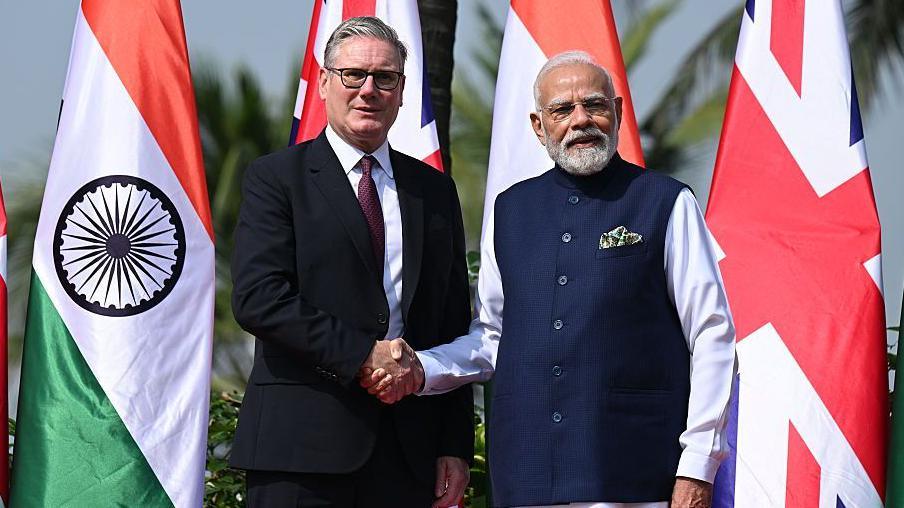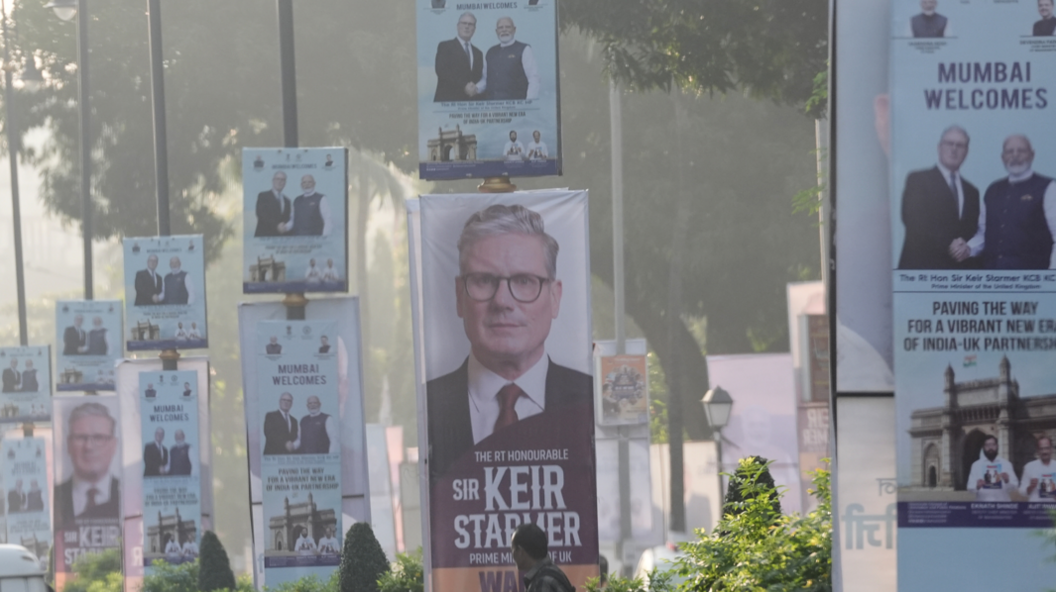Starmer hails India trade deal as 'launchpad' after meeting Modi

This is Starmer's first visit to India, where he is leading a large trade delegation
- Published
Sir Keir Starmer has praised the UK-India trade deal as a "launchpad" for closer ties after meeting Prime Minister Narendra Modi in Mumbai.
The two leaders met to discuss ways to expand business and trade links after they signed a landmark trade deal in July.
Sir Keir's two-day visit to India's financial capital involved the UK's largest-ever trade delegation of more than 100 CEOs, entrepreneurs, university vice-chancellors and cultural leaders.
Among the other issues discussed by the two prime ministers was the war in Ukraine, as India continues to buy Russian fossil fuels, helping to fund Vladimir Putin's war effort.
Sir Keir described the trade deal as "huge" for the UK and "the most ambitious trade deal India has ever done".
Speaking at a press conference, he said: "This trade deal is a launchpad to boost British leadership in everything from tech, to life sciences, to renewable energy and much more beyond that...
"The opportunity is clear - Just look at the sheer scale of India, the world's largest democracy on track to become the third-largest economy by 2028."
In their meeting, the PM said the pair discussed the need for "a just and lasting peace in Ukraine, the need for stability and security in the Indo-Pacific, and the need to co-operate in critical areas like climate and energy, including breaking away from dependence on fossil fuels".
Asked whether he raised the issue of India buying Russian oil, Sir Keir told journalists: "Yes, we did discuss that this morning with President Modi, and we each went through the steps we're taking to bring about a resolution of the conflict."
Modi has described himself as a friend of Putin, but suggested he wanted to see the Ukraine war come to an end through "dialogue and diplomacy".
Sir Keir said he also raised the case of Jagtar Singh Johal, a British Sikh activist who has been held in an Indian prison for seven years without a conviction.

Thousands of photos of Sir Keir Starmer and Narendra Modi line streets in Mumbai
Arriving in India, the prime minister was given a rousing welcome, with thousands of giant photos of him and Modi lining the streets in Mumbai.
On Thursday Sir Keir announced more UK universities would be opening campuses in India, which the government said would bring a £50m boost to the economy.
Confirming that the University of Lancaster and the University of Surrey had been given approval for new campuses, he said: "I'm delighted that more Indian students will be able to benefit from a world-class British education in the near future – strengthening the ties between our two countries while pumping millions back into our economy and supporting jobs at home."
The UK has a growing network of international campuses in India, with the University of York, University of Aberdeen and Queen's University Belfast among those expected to open campuses from as early as next year.
On his first day, Sir Keir met the founder of India's digital ID system - Nandan Nilekani - in the wake of plans to introduce a digital ID for people working in the UK.
The government's plan to introduce compulsory digital ID for people to prove their right to work in the UK has seen more than 2.8 million people signing a petition against the idea. But Downing Street is determined to press on, claiming it will curb the ability of migrants to work illegally.
The government says the yet-to-be-implemented UK-India trade deal has already led to £1bn of investment and almost 7,000 jobs being created in the UK.
Under the deal the UK will cut taxes on goods imported from India including clothing, footwear, jewellery and frozen seafood, while India will reduce duties on the import of Scotch whisky, cosmetics, medical devices and luxury cars.

Sign up for our Politics Essential newsletter to keep up with the inner workings of Westminster and beyond.